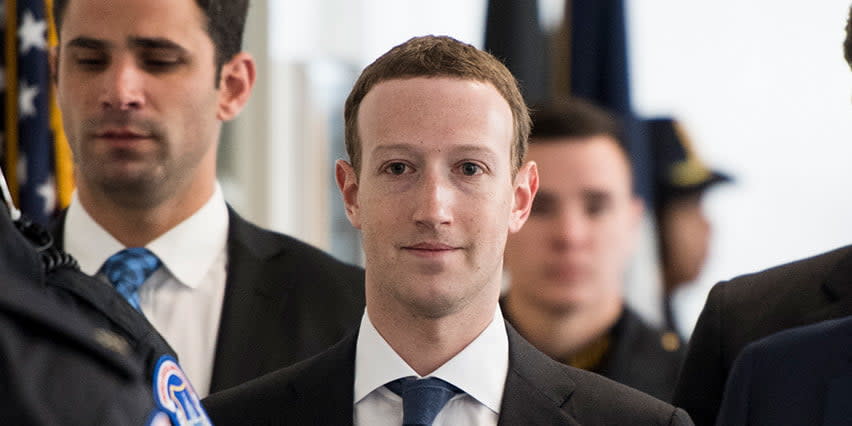Facebook and Zuckerberg are rebounding
It took Mark Zuckerberg a while to find his voice, amid the biggest reputational challenge his company has faced. But the Facebook (FB) CEO now seems to have a plan, along with the money and technical know-how needed to enact it.
After letting subordinates do most of the talking for months, Zuckerberg finally showed up on Capitol Hill and took responsibility for problems plaguing his company. “It’s clear now that we didn’t do enough to prevent [our] tools from being used for harm,” Zuckerberg told a Senate committee on April 10. “That goes for fake news, foreign interference in elections, and hate speech, as well as developers and data privacy. We didn’t take a broad enough view of our responsibility, and that was a big mistake. It was my mistake.”
That’s the right tone for explaining how Russian operatives created at least 470 accounts and 80,000 Facebook posts that reached a staggering 126 million people during the last election cycle. For explaining how research firm Cambridge Analytica accessed unauthorized data on 87 million Facebook users and later used that data while working on behalf of Donald Trump’s political campaign. For explaining why Facebook has been habitually dismissive of the concerns Zuckerberg now claims to share himself.
But will Zuckerberg act convincingly? Will the company change? Quite possibly so. Zuckerberg arrived on Capitol Hill with some meaningful deliverables. He seems to have gotten religion regarding abusive practices on Facebook, and his company seems to be pivoting in a direction that could benefit all of social media.

There are three basic steps to solving big institutional problems like the ones Facebook faces right now. First you have to recognize the problem, including its full scope. Then you have to identify solutions, regardless of the cost. Finally, you have to follow through, including a thorough and if possible quantitative assessment of whether you succeeded. If you didn’t, you’re not done.
[Check out our survey revealing how many Facebook quitters there are.]
These steps might sound simple, but corporate crises often fester amid pressure to protect profitability, resistance to uncomfortable changes and the mere difficulty of reforming big institutions. Facebook failed in its initial response to complaints about political maneuvering on its platform during the 2016 elections, when Zuckerberg said it was “crazy” to think anything like that could have gone on.
Zuckerberg now acknowledges he was wrong. He has identified the problem, even if reluctantly. He has also developed concrete steps to address it, which is a lot better than the vague reassurances we got from Zuckerberg and other Facebook execs as recently as a few weeks ago. Among other things, Facebook says it will now specifically authorize anybody running a political ad on its platform—an important step that should help identify who’s doing what, instead of allowing agitators to hide. Facebook will also require users running “large pages” to be verified, to prevent poseurs with hidden agendas from circulating propaganda. These steps won’t chase every jerk off of Facebook. But they’ll help patch the gaping hole in social media, which up till now has been the ability to hide behind a fake identity.
Facebook has made promises before with regard to protecting users’ data that turned out to be half-hearted. The Federal Trade Commission, for instance, is investigating whether Facebook may have violated a 2011 consent decree governing user privacy, which could carry billions in fines. It’s encouraging that Zuckerberg says the new measures he plans to enact “will significantly impact our profitability.” If there’s a cost, investors will care, which means it’s imperative for Zuckerberg and other Facebook execs to get it right.
Facebook’s stock rose 4.5% on Zuckerberg’s first day of testimony, its best performance in two years. That’s a thumbs-up from investors. The company’s shares have regained a little less than half the ground lost after the Cambridge Analytica revelations on March 17, which sent the stock reeling. That sounds about right. The market is signaling that the company has started to address its problems in earnest, with more work to do.
Facebook has a few other things going for it: For all the controversy, users have not been harmed on the scale of, say, the 2017 Equifax hack in which criminals got financial data on 146 million consumers. Some Facebook users don’t feel harmed at all. Facebook is also free, and there’s no competitor that lets people connect with friends and family in quite the same way. Finally, Americans often forgive fallen brands if they see genuine improvement, which is why they still drive cars from General Motors after the automaker’s unpopular bailout, fly United after the appalling abuse of a passenger, and buy Samsung phones despite those exploding batteries of yore. It’s a good bet Facebook will join this list of arrogant, then humble, then resurgent survivors.
Confidential tip line: rickjnewman@yahoo.com. Encrypted communication available.
Read more:
Rick Newman is the author of four books, including Rebounders: How Winners Pivot from Setback to Success. Follow him on Twitter: @rickjnewman
Follow Yahoo Finance on Facebook, Twitter, Instagram, and LinkedIn

 Yahoo Finance
Yahoo Finance 
